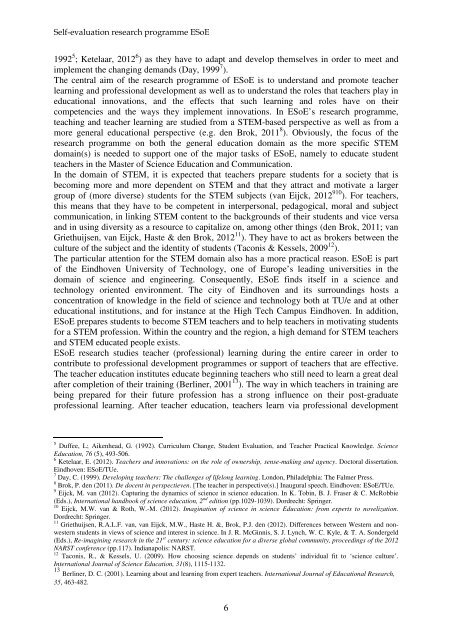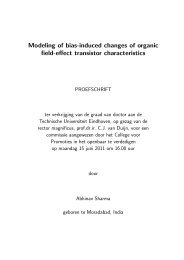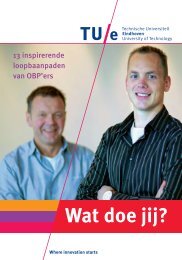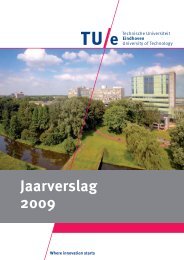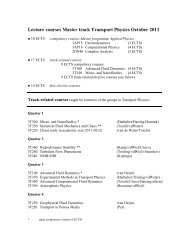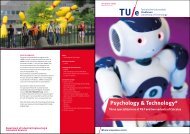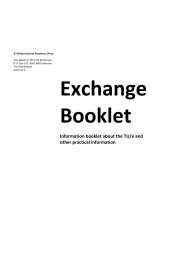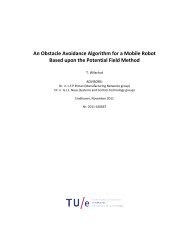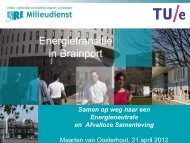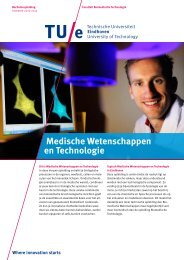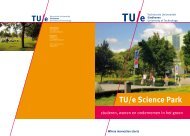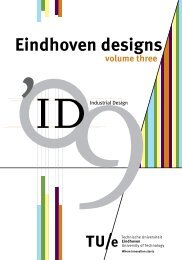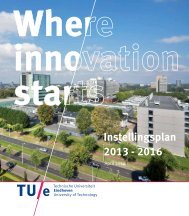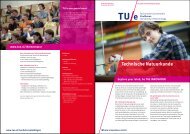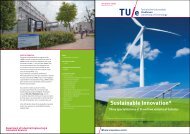Self-evaluation - Technische Universiteit Eindhoven
Self-evaluation - Technische Universiteit Eindhoven
Self-evaluation - Technische Universiteit Eindhoven
You also want an ePaper? Increase the reach of your titles
YUMPU automatically turns print PDFs into web optimized ePapers that Google loves.
<strong>Self</strong>-<strong>evaluation</strong> research programme ESoE<br />
1992 5 ; Ketelaar, 2012 6 ) as they have to adapt and develop themselves in order to meet and<br />
implement the changing demands (Day, 1999 7 ).<br />
The central aim of the research programme of ESoE is to understand and promote teacher<br />
learning and professional development as well as to understand the roles that teachers play in<br />
educational innovations, and the effects that such learning and roles have on their<br />
competencies and the ways they implement innovations. In ESoE’s research programme,<br />
teaching and teacher learning are studied from a STEM-based perspective as well as from a<br />
more general educational perspective (e.g. den Brok, 2011 8 ). Obviously, the focus of the<br />
research programme on both the general education domain as the more specific STEM<br />
domain(s) is needed to support one of the major tasks of ESoE, namely to educate student<br />
teachers in the Master of Science Education and Communication.<br />
In the domain of STEM, it is expected that teachers prepare students for a society that is<br />
becoming more and more dependent on STEM and that they attract and motivate a larger<br />
group of (more diverse) students for the STEM subjects (van Eijck, 2012 910 ). For teachers,<br />
this means that they have to be competent in interpersonal, pedagogical, moral and subject<br />
communication, in linking STEM content to the backgrounds of their students and vice versa<br />
and in using diversity as a resource to capitalize on, among other things (den Brok, 2011; van<br />
Griethuijsen, van Eijck, Haste & den Brok, 2012 11 ). They have to act as brokers between the<br />
culture of the subject and the identity of students (Taconis & Kessels, 2009 12 ).<br />
The particular attention for the STEM domain also has a more practical reason. ESoE is part<br />
of the <strong>Eindhoven</strong> University of Technology, one of Europe’s leading universities in the<br />
domain of science and engineering. Consequently, ESoE finds itself in a science and<br />
technology oriented environment. The city of <strong>Eindhoven</strong> and its surroundings hosts a<br />
concentration of knowledge in the field of science and technology both at TU/e and at other<br />
educational institutions, and for instance at the High Tech Campus <strong>Eindhoven</strong>. In addition,<br />
ESoE prepares students to become STEM teachers and to help teachers in motivating students<br />
for a STEM profession. Within the country and the region, a high demand for STEM teachers<br />
and STEM educated people exists.<br />
ESoE research studies teacher (professional) learning during the entire career in order to<br />
contribute to professional development programmes or support of teachers that are effective.<br />
The teacher education institutes educate beginning teachers who still need to learn a great deal<br />
after completion of their training (Berliner, 2001 13 ). The way in which teachers in training are<br />
being prepared for their future profession has a strong influence on their post-graduate<br />
professional learning. After teacher education, teachers learn via professional development<br />
5 Duffee, L; Aikenhead, G. (1992). Curriculum Change, Student Evaluation, and Teacher Practical Knowledge. Science<br />
Education, 76 (5), 493-506.<br />
6 Ketelaar, E. (2012). Teachers and innovations: on the role of ownership, sense-making and agency. Doctoral dissertation.<br />
<strong>Eindhoven</strong>: ESoE/TUe.<br />
7 Day, C. (1999). Developing teachers: The challenges of lifelong learning. London, Philadelphia: The Falmer Press.<br />
8 Brok, P. den (2011). De docent in perspectieven. [The teacher in perspective(s).] Inaugural speech. <strong>Eindhoven</strong>: ESoE/TUe.<br />
9 Eijck, M. van (2012). Capturing the dynamics of science in science education. In K. Tobin, B. J. Fraser & C. McRobbie<br />
(Eds.), International handbook of science education, 2 nd edition (pp.1029-1039). Dordrecht: Springer.<br />
10 Eijck, M.W. van & Roth, W.-M. (2012). Imagination of science in science Education: from experts to novelization.<br />
Dordrecht: Springer.<br />
11 Griethuijsen, R.A.L.F. van, van Eijck, M.W., Haste H. &, Brok, P.J. den (2012). Differences between Western and nonwestern<br />
students in views of science and interest in science. In J. R. McGinnis, S. J. Lynch, W. C. Kyle, & T. A. Sondergeld<br />
(Eds.), Re-imagining research in the 21 st century: science education for a diverse global community, proceedings of the 2012<br />
NARST conference (pp.117). Indianapolis: NARST.<br />
12 Taconis, R., & Kessels, U. (2009). How choosing science depends on students’ individual fit to ‘science culture’.<br />
International Journal of Science Education, 31(8), 1115-1132.<br />
13 Berliner, D. C. (2001). Learning about and learning from expert teachers. International Journal of Educational Research,<br />
35, 463-482.<br />
6


